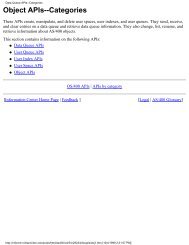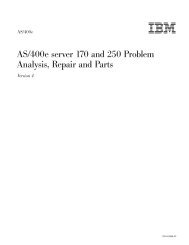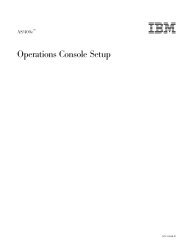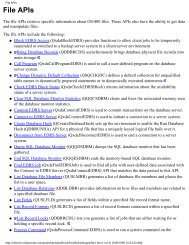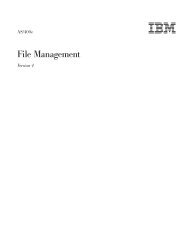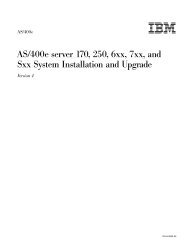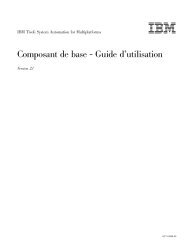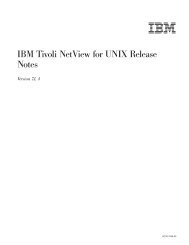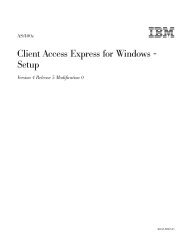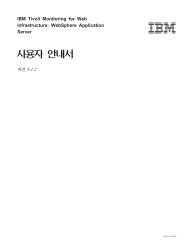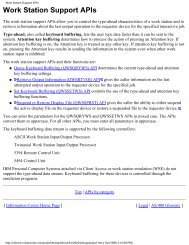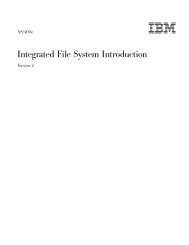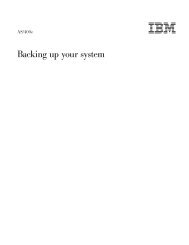Qshell Interpreter (qsh) - FTP Directory Listing - IBM
Qshell Interpreter (qsh) - FTP Directory Listing - IBM
Qshell Interpreter (qsh) - FTP Directory Listing - IBM
You also want an ePaper? Increase the reach of your titles
YUMPU automatically turns print PDFs into web optimized ePapers that Google loves.
Parameters<br />
Positional parameters<br />
Special parameters<br />
12 <strong>Qshell</strong> <strong>Interpreter</strong> (<strong>qsh</strong>)<br />
A parameter is used to store data. You can access the value of a parameter by<br />
preceding its name with a dollar sign ($) and surrounding the name with brackets ({<br />
}). The brackets are optional when the name is a single digit, or a special<br />
parameter, or the name is a single identifier. See “Parameter expansion” (page 16)<br />
for more information on expanding the value of a parameter.<br />
A positional parameter is a decimal number starting from one. Initially, <strong>qsh</strong> sets the<br />
positional parameters to the command line arguments that follow the name of the<br />
shell script. The positional parameters are temporarily replaced when a shell<br />
function is called and can be reassigned using the set and shift utilities.<br />
A special parameter is denoted by one of these special characters:<br />
* (Positional parameters)<br />
(Asterisk) Expands to the positional parameters, starting from one. When<br />
the expansion occurs within a double-quoted string it expands to a single<br />
field with the value of each parameter separated by the first character of the<br />
IFS variable, or by a if IFS is unset.<br />
@ (Positional parameters)<br />
(Ampersand) Expands to the positional parameters, starting from one.<br />
When the expansion occurs within double-quotes, each positional<br />
parameter expands as a separate argument. If there are no positional<br />
parameters, the expansion of @ generates zero arguments, even when @<br />
is double-quoted.<br />
# (Number of positional parameters)<br />
(Number sign) Expands to the decimal number of positional parameters. It<br />
is initially set to the number of arguments when <strong>qsh</strong> is invoked. It can be<br />
changed by the set, shift, or dot utilities or by calling a function.<br />
? (Exit status)<br />
(Question mark) Expands to the decimal exit status of the most recent<br />
command. A value of zero indicates successful completion. A non-zero<br />
value indicates an error. A command ended by a signal has an exit status of<br />
128 plus the signal number.<br />
- (Option flags)<br />
(Minus) Expands to the current option flags (the single-letter option names<br />
concatenated into a string) as specified when <strong>qsh</strong> is invoked, by set, or<br />
implicitly by <strong>qsh</strong>.<br />
$ (Process ID of current shell)<br />
(Dollar sign) Expands to the decimal process ID of the current shell. A<br />
subshell retains the same value of $ as the current shell even if the<br />
subshell is running in a different process.<br />
! (Background process ID)<br />
(Exclamation mark) Expands to the decimal process ID of the most recent<br />
background command run from the current shell. For a pipeline, the<br />
process ID is that of the last command in the pipeline.



